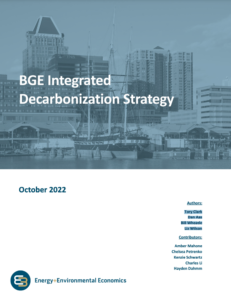Full Title: BGE Integrated Decarbonization Strategy
Author(s): Tory Clark, Dan Aas, Bill Wheatle, Liz Wilson
Publisher(s): Energy and Environmental Economics
Publication Date: October 6, 2022
Full Text: Download Resource
Description (excerpt):
The State of Maryland has begun its transition to a deeply decarbonized economy, building upon over a decade of climate change mitigation efforts, including work led by the State. To achieve the State’s climate goals, which were updated and accelerated in the Climate Solutions Now Act of 2022 to target a net zero economy by 2045, it will be critical for Maryland to reduce emissions from buildings, industry, and transportation sectors. E3 worked with Baltimore Gas and Electric (BGE) to explore the necessary transformations needed in BGE’s service territory to accomplish the State’s goals. As the largest utility in Maryland, BGE has a critical role to play and is a key partner in decarbonizing the Maryland economy.
Working with BGE, E3 developed three alternative decarbonization scenarios that vary both the use of the company’s gas and electric infrastructure and the mix of technology solutions that customers adopt across sectors. The Hybrid and Diverse scenarios are Integrated Energy System Scenarios, meaning that they rely on a combination of electric and gas delivery infrastructure to achieve decarbonization. The Hybrid scenario focuses on building electrification with a critical role for natural gas back-up in cold hours of the year. The Diverse scenario focuses on a wide variety of solutions in buildings including electrification, hybrid systems, networked geothermal solutions, and decarbonized fuels. In contrast, the Limited Gas scenario shifts a larger share of energy demands to BGE’s electric system.
The study finds that there are multiple paths to decarbonization and any future that meets Maryland’s net zero goals will require significant transformations and investments across the economy and demand a critical role for electrification in transportation and buildings.
